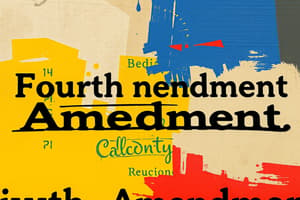Podcast
Questions and Answers
What does the Fourth Amendment prevent?
What does the Fourth Amendment prevent?
- Illegal searches and seizures (correct)
- Double jeopardy
- Unfair trials
- Self-incrimination
What is a search warrant?
What is a search warrant?
A court order authorizing a search
What is the exclusionary rule?
What is the exclusionary rule?
Evidence not allowed in court due to illegal recovery
What amendment forbids illegal wiretaps?
What amendment forbids illegal wiretaps?
Mapp v.s Ohio is associated with which legal principle?
Mapp v.s Ohio is associated with which legal principle?
What does the Sixth Amendment guarantee?
What does the Sixth Amendment guarantee?
What does the right to counsel give you?
What does the right to counsel give you?
What was the outcome of Gideon v.s Wainwright?
What was the outcome of Gideon v.s Wainwright?
What does the Fifth Amendment forbid?
What does the Fifth Amendment forbid?
What is self-incrimination?
What is self-incrimination?
Which court case established the rights of arrested individuals?
Which court case established the rights of arrested individuals?
What do Miranda rights include?
What do Miranda rights include?
What is presentment?
What is presentment?
What is a docket?
What is a docket?
What is a bench trial?
What is a bench trial?
Federal court cases must be determined by an ____________ verdict.
Federal court cases must be determined by an ____________ verdict.
What does bail allow?
What does bail allow?
Police have extra leeway when it comes to searching __________.
Police have extra leeway when it comes to searching __________.
What does habeas corpus require?
What does habeas corpus require?
What is a bill of attainder?
What is a bill of attainder?
During riots, the government may restrict individual __________.
During riots, the government may restrict individual __________.
What is required to search a student's locker at school?
What is required to search a student's locker at school?
Courts have ruled schools need only _______ ______ to search students/possessions.
Courts have ruled schools need only _______ ______ to search students/possessions.
What was the outcome of Brown v.s Mississippi?
What was the outcome of Brown v.s Mississippi?
What is a grand jury?
What is a grand jury?
What is probable cause?
What is probable cause?
What does police power refer to?
What does police power refer to?
The access to counsel means you have the right to ______________ defense.
The access to counsel means you have the right to ______________ defense.
Study Notes
Fourth Amendment
- Prevents illegal searches and seizures, safeguarding personal privacy and property.
- Forbids illegal wiretaps, enhancing protection against unwarranted governmental intrusion.
Search Warrant
- A court order that authorizes law enforcement to conduct a search of a specified location or individual.
Exclusionary Rule
- Prohibits the use of evidence in court that was obtained unlawfully or through illegal means.
Landmark Cases
- Mapp v. Ohio: Established the exclusionary rule following illegal search practices during the pursuit of a fugitive.
- Gideon v. Wainwright: Affirmed the right to counsel by granting a retrial to an uneducated man who was denied legal representation.
- Miranda v. Arizona: Introduced Miranda rights, mandating that arrested individuals be informed of their rights, including the right to remain silent.
Fifth Amendment
- Protects individuals from self-incrimination and prohibits double jeopardy, preventing a person from being tried twice for the same crime.
Eighth Amendment
- Prohibits cruel and unusual punishment, shaping humane treatment within the justice system.
Right to Counsel
- Ensures defendants can receive adequate legal representation during trial, essential for a fair trial.
Bail and Due Process
- Bail allows temporary release of an accused pending trial, contingent on monetary assurances of appearance.
- Due process guarantees fair application and enforcement of the law.
Jury Considerations
- A change in venue may be requested to ensure an impartial jury if local bias is feared.
- Federal court cases require a unanimous verdict for determination of guilt or innocence.
Police Powers and Searches
- Police have increased leeway in searching vehicles compared to personal property.
- Schools require only reasonable grounds to search students or their possessions.
- No evidence is necessary for searching student lockers.
Grand Jury
- Consists of citizens who decide whether sufficient evidence exists to charge someone with a crime.
Probable Cause
- Refers to a reasonable basis to believe that a person or their premises is connected to criminal activity.
Legislative Protections
- A bill of attainder imposes punishment on individuals without a trial, which is prohibited by law.
Public Safety and Riots
- Individual freedoms can be restricted by the government during times of civil unrest or riots to maintain order.
Legal Terminology
- Presentment: A formal report by a grand jury to initiate a trial.
- Docket: The schedule of cases to be heard in court.
- Bench Trial: A legal proceeding where a judge makes the decision without a jury.
- Habeas Corpus: Requires authorities to justify the detention of an accused individual.
Additional Notes
- The term "unanimous" is critical in ensuring a fair trial within federal courts.
- The concept of "adequate" access to counsel underscores the necessity of effective legal defense during trials.
Studying That Suits You
Use AI to generate personalized quizzes and flashcards to suit your learning preferences.
Description
Explore the critical aspects of the Fourth and Fifth Amendments, focusing on illegal searches, the Exclusionary Rule, and landmark Supreme Court cases. Understand the fundamental rights that protect personal privacy, the importance of search warrants, and the right to counsel. Test your knowledge on how these amendments shape legal protections in the United States.




